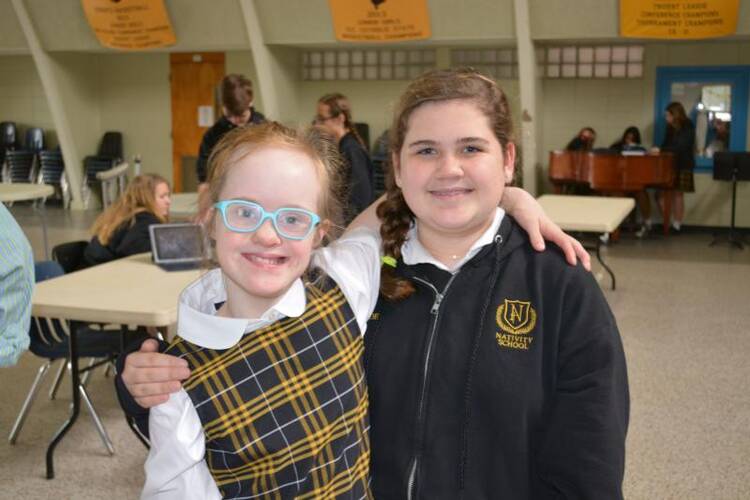JAMES ISLAND, S.C. (CNS) -- When Nativity School was approached with the idea of integrating a child with Down syndrome into a regular classroom setting, officials' first reaction was "sure, let's figure this out and make it work," said Cindy May, a parishioner at the Cathedral of St. John the Baptist in Charleston.
May contacted the school about Maybelle, her adopted child with Down syndrome and autism, when she was in the first grade. Now, three years later, Nativity School has received the Dandy Award from the National Catholic Board on Full Inclusion for their leadership and vision in including all students.
The board is a nonprofit, public benefit corporation that seeks to educate and support Catholic schools nationwide on including diverse learners with typical learners.
This movement has been gaining momentum in recent years, although Bishop England High School has been practicing full inclusion since 2007 with May's guidance. Back then, May was working toward getting Grace, her biological daughter with Down syndrome, into Bishop England.
Sadly, Grace died of leukemia just before she was to begin high school, but the groundwork was established, and the program has been going on successfully ever since.
The Journal of Policy and Practice in Intellectual Disabilities provides a report and statistics showing that regular education is more stimulating for academic skill development.
More Catholic schools have integrated the full inclusion program, including St. John in North Charleston and Summerville Catholic.
Full inclusion means that any student with a diverse learning ability, such as autism, Down syndrome, or any other intellectual disability, is fully integrated into the classroom with other typical learners. At Nativity, for example, Maybelle participates in every aspect of the day-to-day classroom setting.
Patti Dukes, principal at Nativity, said their diverse learners will have tests and lessons modified to accommodate their learning needs, but for the most part they do everything that all the other students do.
Maybelle also plays on the basketball team, Dukes said.
Amber Knight is the staff's "academic success in a resourceful environment" teacher at Nativity.
When the children test, they go with her to the "stim" classroom. "Stim" stands for self-stimulatory behavior, and the room provides gadgets and comfort devices to help the students feel more at ease. It has a swing, stationary bike, balance-ball chairs, iPads and more for the students to use for testing purposes and other lessons.
May said the school infuses inclusion into their educational model and social culture well.
"(Maybelle) has friends there and they truly accept her for who she is," May told The Catholic Miscellany, newspaper of the Diocese of Charleston. "I think it makes the other students more tolerant of people who are different than you."
Dukes said the program started on a leap of faith.
"We have the desire to meet all our children's needs," she said. "We are serving our population and we want all our students to reach their full potential. It has taken a lot of teamwork, but together we have made a difference in the lives of these children."









As a retired Special Education teacher who instructed children with brain damage, I commend the staff , students, and families at Nativity School for including children with diverse needs into their school. I taught at an "approved private school.' The label "private" didn't imply that our school had an upper income level of students. Our school is a public school that educates students who can't receive an appropriate education in their home school district school. In fact, many of our students cane from school districts where many students were from poor families. To be honest, due to the severity of the brain damage of many of our school's students, I imagine that many of our children would not benefit from being in a "regular" school. However, I believe that many would benefit, with teacher assistants trained in educating special needs learners, as well as having access to speech, physical and occupational therapists as needed. Ultimately, I think it's worthwhile to include special needs learners in regular education schools, with necessary support staff. Each one of us is made in God's image. I commend the effort to include as many students who are disabled into "regular" school settings, regardless of the severity of the individual child's needs. Just as segregation by race in public schools was wrong, so to is segregating disabled students from their peers in regular education schools.